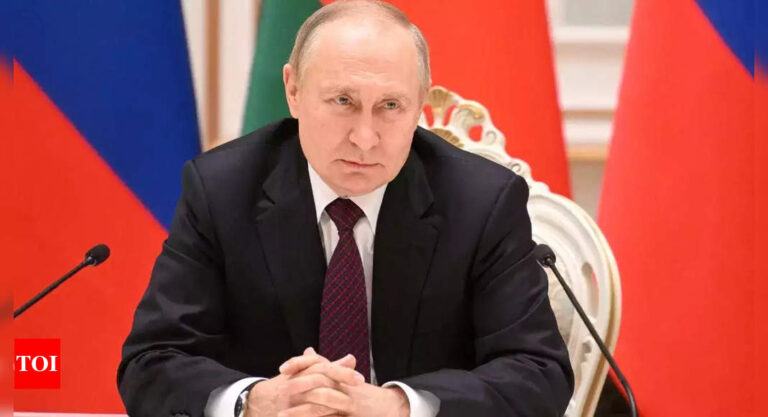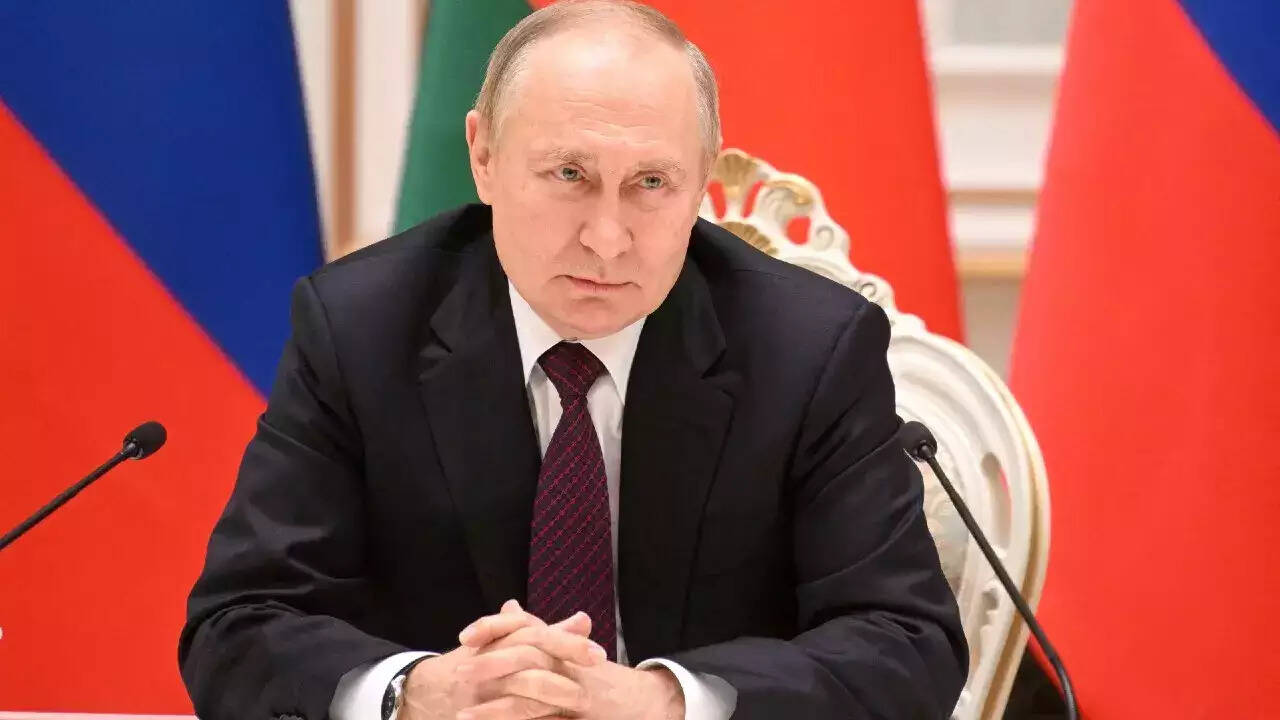
[ad_1]
ICC prosecutor Karim Khan said that Putin was now liable for arrest if he set foot in any of the court’s more than 120 member states.
Russia is not a party to the ICC so it was unclear if or how Putin could ever end up in the dock. India is also not an ICC member and Putin is expected to travel to New Delhi at the end of the year for the G20 world leaders’ summit.
Though President Joe Biden has welcomed the ICC move, even the US is not an ICC member fearing that the court’s broad mandate could result in the prosecution of American troops or officials.
The Hague-based ICC said it had also issued a warrant against Maria Lvova-Belova, Russia’s presidential commissioner for children’s rights, on similar charges.
Meanwhile, war-battered Ukraine welcomed the ICC announcement, with President Volodymyr Zelensky hailing the “historic decision.”
Here is everything you need to know about the case:
What is the ICC?
The International Criminal Court was established in 2002 to prosecute war crimes, crimes against humanity, genocide and the crime of aggression when member states are unwilling or unable to do so themselves.
The tribunal is based in The Hague, Netherlands, and leads high-profile investigations into prominent suspects.
It can prosecute crimes committed by nationals of member states or on the territory of member states by other actors. It has 123 member countries.
What crimes is Putin accused of?
Both Putin and Lvova-Belova are accused of being responsible for the war crime of unlawful deportation of people, in particular children, and their unlawful transfer from occupied areas of Ukraine to the Russian Federation.
Citing a report of the United Nations Commission of Inquiry, the BBC said in a report that some of these children were forced to take Russian citizenship and placed in foster families due to which they ended up “remaining permanently” in Russia.
If further said that the transfers were meant to be temporary but both parents and children faced “an array of obstacles in establishing contact”. There are 16,221 children who were forcibly taken to Russia, according to the UN investigators.
The ICC said it sees reasonable grounds to believe that Putin bears “individual responsibility for the crimes either by committing them directly, jointly with others and/or through others”.
It also said that Putin failed to exercise proper control over civilian and military subordinates who committed the acts or allowed for their commission and who were under his effective authority and control.
The arrest warrant obliges member states to arrest Putin or Lvova-Belova if they were to travel to their country. The ICC, however, has no police force of its own or other ways to enforce arrests.
Can Putin be put on trial?
The arrest warrants theoretically mark the first step towards an eventual trial – although under current conditions, the capture and arraignment of Russia’s president is almost inconceivable.
The Russian President enjoys unchallenged power in his homeland, so there is no prospective of the Kremlin handing him over to the ICC. Till the time he is in Russia, Putin faces no risk of being arrested.
Even if an arrest did happen, previous ICC cases have shown it is hard to convict the most senior officials. In more than 20 years, the court has only issued five convictions for core crimes, and none was for a top official.
But the ICC investigations into international figures are not the only option. War crimes can also be prosecuted in Ukraine’s own courts, and a growing number of countries are conducting their own investigations.
There are also plans to create a new tribunal to prosecute the Russian invasion as a crime of aggression. The ICC cannot bring such a charge due to legal constraints.
What is the impact of the warrant?
In the immediate term, the ICC’s warrant for Putin and one of his aides is unlikely to have a major impact.
In addition, it is highly unlikely that Putin would travel to a country that would be bound by obligations to the ICC.
If he did, it is questionable whether that country would actually arrest him. There is precedent for those previously indicted, notably former Sudanese President Omar Bashir, to have visited ICC members without being detained.
However, the stain of the arrest warrant could well work against China and Russia in the court of public opinion and Putin’s international status may take a hit unless the charges are withdrawn or he is acquitted.
What is Russia’s reaction?
Russia, which denies committing atrocities since it invaded Ukraine, rejected the ICC’s move as “null and void”.
“The decisions of the International Criminal Court have no meaning for our country, including from a legal point of view,” Russian Ministry of Foreign Affairs spokeswoman Maria Zakharova said on her Telegram channel.
“Russia is not a party to the Rome Statute of the International Criminal Court and bears no obligations under it,” she wrote.
What is ICC’s stand?
ICC president Piotr Hofmanski said it is “completely irrelevant” that Russia had not ratified the Rome Statute.
“According to the ICC statute, which has 123 state parties, two-thirds of the whole international community, the court has jurisdiction over crimes committed in the territory of a state party or a state which has accepted its jurisdiction,” he said. “Ukraine has accepted the ICC twice – in 2014 and then in 2015.”
Hofmanski said 43 states had referred “the situation in Ukraine to the court, which means they have formally triggered our jurisdiction”.
“The court has jurisdiction over crimes committed on anyone on the territory of Ukraine from November 2013 onwards regardless of nationality of the alleged perpetrators,” Hofmanski said.
What is Ukraine’s reaction to the notice?
Ukrainian prosecutor general Andriy Kostin hailed the announcement by the ICC.
“The world received a signal that the Russian regime is criminal and its leadership and henchmen will be held accountable,” he said. “This is a historic decision for Ukraine and the entire system of international law.”
What are the war crimes allegedly committed by Russia?
The UN panel of investigators said apart from rape and torture, Russians are also responsible for attacks on Ukraine’s energy infrastructure.
It also highlights the mass burial sites – in Bucha and Izium (in Kharkiv) – accusing Russia of more serious “crimes against humanity”.
There are also allegations from Ukraine’s President Volodymyr Zelenskyy of Russian committing 400 war crimes in the Kherson region alone.
(With inputs from agencies)
Watch International Criminal Court issues arrest warrant for Vladimir Putin
[ad_2]
Source link
